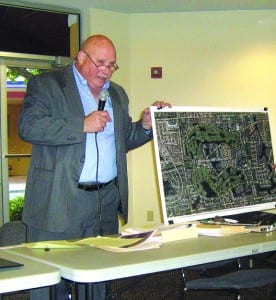
Initially planned as an informational session, a Kendall Federation of Homeowner Associations public meeting on June 8 became a near 90- minute opposition rally that protested a proposed Miccosukee land trust takeover of the former Kendale Lakes Country Club.
The absence of invited Miami-Dade officials and a tribal spokesman largely submerged KFHA’s intention for an open discussion.
KFHA president Michael Rosenberg, in a post meeting comment, said, “The lack of a tribal representative appearance implies something may be concealed.”
Rosenberg had sought attendance by a tribal officer for an open dialogue with residents to explain reasons for the 12-year Miccosukee effort to place the 230-acre golf course under a U.S. Bureau of Indian Affairs land trust, begun in 2003 and revived in 2012.
Although the tribe previously told the Bureau it intends to continue golf operations, residents fear the possibility of a casino, condominium or other non-golf use on the property, once tribal authority supersedes county regulations.
“The only answer I could get through a tribal office worker was ‘what are they afraid of,’” Rosenberg told an audience of more than 100. An effort to reach a spokesperson for later comment was unanswered at press time.
Residents believe they have been unfairly left out of the Bureau’s procedure for a land trust decision undoing protection written into property sale documents in place since initial 1972 development of Kendale Lakes.
Covenants written for homeowners who live within 150 feet of the golf course property require 75 percent signoffs before any land use change can occur, as well as county commission approvals.
A Bureau official recently told the Gazette a public hearing for citizens related to property change is conducted only if a casino is proposed on tribal land under trust.
“Now, the only thing we can do is organize a grassroots movement by designated committees to develop a cohesive plan for a formal objection,” concluded Miles Moss, a former KFHA president, acting as meeting emcee with 39-year Kendale Lakes resident Aster Mohamad who signed community protest volunteers.
“We wonder what kind of security homeowner families will face if a casino attracts nighttime crowds, leaving at early morning hours,” added Moss who said property devaluation was also a key issue for homeowners.
Invited to participate as a legal panel were Assistant State Attorneys Christine E. Zahralban and George Cortina who explained State Attorney Katherine Fernandez Rundle’s objections to a tribal trust in a “commentary” letter sent to the Bureau on Apr. 21.
“No, we’ve received no reply to the letter nor acknowledgement,” replied Zahralban, who said jurisdictional issues with policing tribal lands were the state attorney’s primary concern.
“We have had incidents in the past where the tribal police have not been cooperative,” she said, noting a 1999 incident when a tribal member who drove a family of six into a county-maintained canal within tribal property resulted in their drowning. The tribal member was later freed from potential felony indictments by a tribal panel that holds jurisdiction in criminal cases involving tribal members.
Rundle’s 2015 letter also cited a 2008 incident when the Miccosukee Police Department failed to arrest a vehicle driver despite county evidence of impairment by alcohol after a SR84 crash causing serious injuries to another car driver.
Copies of two letters, the first dated Oct. 15, 2003 listing initial objections by Rundle upon first Bureau notice of the tribal application, and a second dated Apr. 21 after the 2012 revival of the issue, were distributed at the meeting’s conclusion.
In addition to policing issues, a 32-page letter by Assistant County Attorney Ileana Cruz dated Mar. 20 cited multiple objections involving potential tribal authority conflicts with county regulation of drainage, building and land use.
U.S. Rep. Carlos Curbelo provided a statement furnished by district director Christopher Miles: “Our office has been actively engaged with local residents and the tribe throughout this process. We continue to monitor the issue closely. The congressman is opposed to any development that is incongruent with the infrastructure and characteristics of the neighborhood.”






